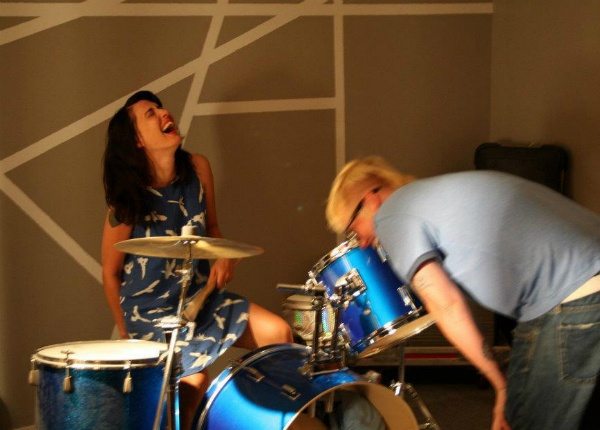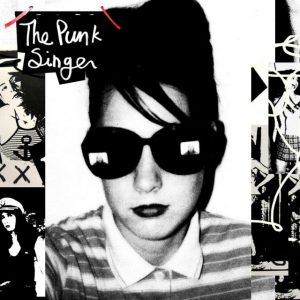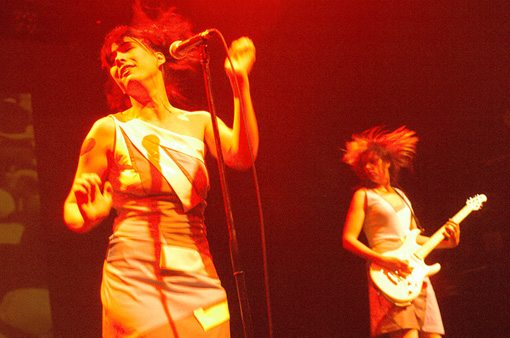
 Sini Anderson's "The Punk Singer" offers a retrospective look at the life of feminist role model Kathleen Hanna. Hanna made heads spin when her band Bikini Kill hit the scene in the 90s, raising awareness of violence against women with forceful lyrics and shocking onstage behavior. She continued to be a driving force of feminism in music until 2005, when the typically loud and proud Hanna suddenly fell silent. For years, Hanna suffered from an illness that doctors could not detect. Finally, she was diagnosed with Lyme Disease in 2010 and could begin a proper road to recovery. We spoke to Hanna about getting back on stage, and what it's like to look back on her days with Bikini Kill.
Sini Anderson's "The Punk Singer" offers a retrospective look at the life of feminist role model Kathleen Hanna. Hanna made heads spin when her band Bikini Kill hit the scene in the 90s, raising awareness of violence against women with forceful lyrics and shocking onstage behavior. She continued to be a driving force of feminism in music until 2005, when the typically loud and proud Hanna suddenly fell silent. For years, Hanna suffered from an illness that doctors could not detect. Finally, she was diagnosed with Lyme Disease in 2010 and could begin a proper road to recovery. We spoke to Hanna about getting back on stage, and what it's like to look back on her days with Bikini Kill.
StageBuddy: Could you tell us about director Sini Anderson and how this project came about?
Kathleen Hanna: Originally, I'd asked Sini if she would [direct]. She was working at a post house right down the street from where I lived and my band Le Tigre wanted to make a tour film, a concert film. So I knew she wanted to direct and I asked if she wanted to do that and she said no [laughs]. And then she came back a couple weeks later - she remembers this totally different but this is how I remember it - she came back to me a couple weeks later and was like "I'd actually like to make a film just about you". And I was kind of freaked out and grossed out by that idea. Then I went home and I thought about it, and because I was really sick at the time and I didn't know what I had, I was kind of like, now or never, and so I said OK, let's do it.
SB: You kept your illness personal for a while, which is understandable, so what was it about "The Punk Singer" that seemed like the right time to publicly announce it?
KH: Well you know nobody had asked me, you know what I mean? I wasn't really doing interviews for anything, I wasn't promoting anything, and I got my diagnosis during the film and it just seemed like, how could I leave this out? You know the same way - I think I said at this part in the film - I'm like how could I leave my friend being assaulted and thinking about violence against women, how could I leave that out of my work? And I kind of felt the same way with like, how could I leave this huge revelation and this huge thing that had massively impacted my life and my ability to do my job. How could I leave that out of my film? And I'd seen "Under Our Skin", a movie about Lyme Disease, and I was deeply impacted by that movie so I wanted to also be like, this is part of my life but this is not my whole life.
SB: When you first started Bikini Kill you were bringing a feminist voice to a genre of music - punk rock - that didn't really have one. In music today, do you see any specific genre in severely lacking a feminist voice?
KH: I definitely think Laptop Rock, besides Grimes, really lacks a female voice. There's still all this kind of crap, like this guy that goes by the name of Girl Talk who's incredibly famous on the underground, and he said he chose his name Girl Talk because he thought that was the opposite of a guy with a laptop. And I was like, "Why would a girl be the opposite of someone with a laptop? You know what I mean, who makes music and does mash-ups and stuff? So I would say in that world, in the world of mash-ups and laptop music and stuff like that.
 SB: The genre of hip-hop usually gets called out a lot for being anti-feminist. Do you think there's validity to that?
SB: The genre of hip-hop usually gets called out a lot for being anti-feminist. Do you think there's validity to that?
KH: No. I mean the same as indie rock or hip-hop or whatever there's always going to be racism, there's always going to be sexism, there's always going to be homophobia. I don't think hip-hop is necessarily more or less... there are just as many sexist lyrics in rock music and in any other genre. I think a lot of times people criticize hip-hop because it's a black medium, and it scares people.
SB: One of the most fascinating things I learned in "The Punk Singer" was that you inadvertently gave Kurt Cobain the title "Smells Like Teen Spirit". Could you tell us a little more about your friendship with Kurt, and his support of you as a musician?
KH: I guess a really special thing was that there were a few times when I went over to his apartment and we shared our lyrics with each other, and I'd never done that with anybody. I'd never done that, been in the middle of writing lyrics and then handing my journal over to somebody, and be like "what do you think about this?" And he showed me lyrics and I was like "I think that would be better over here and da da da". It was kind of like we had this little workshopping experience. It only happened a few times but it was really an amazing experience to have that kind of trust - artistic trust - with somebody.
SB: Now that "The Punk Singer" is done and you've had a chance to see the movie, what's it like seeing yourself perform all those years ago in Bikini Kill?
KH: [laughs] I was really shocked by the Bikini Kill footage. When people used to freak out about our band, they'd either have a really positive feeling about us or a really negative feeling and I didn't understand why until I saw the footage and I realized that I seemed pretty bold and also very weird [laugh] and had a lot of Tasmanian devil energy. It was hard when I was sick to watch that just because I was like "I'll never be like that again". It's kind of alienating actually when I watch it because I feel like it's not me. It's a different me, it's a younger me but I just was like "That's me?"
But even when I listen to our new record I'm like "That's me?" That's how I sing? I hit a certain note and I'm like "I can do that?" It doesn't feel like it's me, it feels like it's somebody else. Which maybe is not healthy and I need therapy [laughs].
SB: Since you were shocked by it, would have done anything differently?
KH: I don't think there would have been the option to do it differently. I wish my band had better communication skills and stuff but I feel like the tension that was often present between the four of us actually added to what it felt like on stage, because it always seemed like we were just about to fall apart. And I think that's an exciting thing to watch onstage. There's a lot of confidence in our performances but there's also the feeling that something's just slightly off and it might just fall over. It took a leap of faith from the audience to believe that these were real songs. And they were, and I think a lot of them were really good songs.
SB: You were one of the loudest voices of the Riot Grrl movement, but a lot of what I've read suggests you were reluctant to be a part of it. Why that reluctance?
KH: Because I was very much a member of the community and that was - and still is - part of my mentality is that things don't happen in a vacuum. There are so many girls and women all around the country and all around the world that had to do with bringing feminism into punk and earlier role models like Alice Bag and Poly Styrene and Ari from The Slits and The Raincoats, Phranc, there were so many women who even if they didn't say they were feminists, they DID feminism. They modeled it for us. I see feminism as a continuum where we're all helping each other out and learning from each other's mistake, and I didn't want to set out to be a leader, because I just wanted to be in a band.
SB: Your new project, The Julie Ruin, just released its first album, Run Fast. How does it feel to finally get new music out there after your forced hiatus?
KH: It feels fucking great. How would you feel if you thought you were going to die and then you lived? [laughs] It feels great, I mean I thought maybe we can get this record finished, maybe we can get this movie finished, and that was as far ahead as I could look because I was still sick during the filming of the movie and was still sick during a lot of the making of the record. It took three years because I could only sing when I was on well days. To finally get it out is like being pregnant for three years and finally having the baby, what a relief! Then to be able to perform live and do Q&As for the movie and do press for the movie, I didn't think that was a possibility. I just wanted these projects to get finished and now I'm like, wow I'm on stage again. It's great.
 SB: Has it been tough doing shows?
SB: Has it been tough doing shows?
KH: I really had no idea what was going to happen. We planned a three week tour, we gave me a lot of days off - two days off in between each show - just to start to see if my body could handle it and I did just great. I had fun on stage and I think I sang really well. So it's worked out great. Now we're able to do shows with just one day off and hopefully we'll get to the point where I don't need a day off between each show.
SB: What do you think of our current political climate?
KH: I think we're in a pretty bad place. What's going on in Texas with women's right to choose and especially with poor women's access to abortion is really scary. It totally frightens me that it keeps going backwards over and over again and people don't seem to remember that these abortion doctors have been murdered. And with Obama, he's just being blocked from being President, which is the same thing that happened to the first black Mayor of Chicago. It's basically all these people who are making the choice for us - we voted him in - and these Republicans are making the choice to say he's not even the President because we're going to let him do anything. It's horrifying. But I do think there are some great things going on in music and I think that things come from the underground up. And I am hopeful things that things will change in the future. They have to, because things can't get much worse.
"The Punk Singer" opens in New York theaters on 11/29. Read our review here.